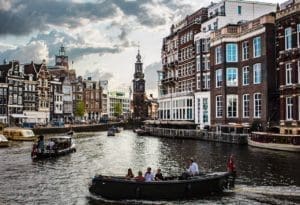Dutch citizenship for EU citizens
Immigrating to the Netherlands is a big and exciting step you may be planning to undertake. If you are a citizen of an EU/EEA country or Switzerland, a smooth and swift process of immigration to Holland awaits you thanks to the agreements made between countries in the EU/EEA and Switzerland. In this article, we explain how to obtain Dutch citizenship for EU citizens and the rights of immigrants to Holland.
EU/EEA and Switzerland
 The Netherlands joined the European Union (EU) from its start in 1958. Currently, the EU contains 27 countries, while five more countries are in the preparation phase for their EU membership. The European Economic Area (EEA) was founded in 1994 by the member states of the EU and the European Free Trade Association (EFTA) to enable goods, capital, person, and services to move freely between the EU and EFTA member countries. Currently the EEA consists of all EU countries and the EFTA countries Iceland, Liechtenstein and Norway. Switzerland is not part of the EU or EFTA, though it forged strong relationships with the Netherlands and other EU and EEA countries, allowing persons to move freely across their borders.
The Netherlands joined the European Union (EU) from its start in 1958. Currently, the EU contains 27 countries, while five more countries are in the preparation phase for their EU membership. The European Economic Area (EEA) was founded in 1994 by the member states of the EU and the European Free Trade Association (EFTA) to enable goods, capital, person, and services to move freely between the EU and EFTA member countries. Currently the EEA consists of all EU countries and the EFTA countries Iceland, Liechtenstein and Norway. Switzerland is not part of the EU or EFTA, though it forged strong relationships with the Netherlands and other EU and EEA countries, allowing persons to move freely across their borders.
EU/EEA and Switzerland citizens in Holland
Thanks to the abovementioned agreements, persons can move freely across the EU/EEA countries and Switzerland. Thus, if you have no Dutch citizenship but you do hold citizenship of an EU/EEA country or Switzerland, you can move freely in the Netherlands. Moreover, you may live and work in the Netherlands without a residence permit or work permit and you are not required to report to the Immigration and Naturalization Service (IND). Your citizenship of an EU/EEA country of Switzerland will proof your legal stay in the Netherlands.
If you stay in Holland for over 4 months, the only practical matter you will have to organize is registering in the personal records database in your local municipality, which will give you a Citizen Service Number (Dutch ID). Your Dutch ID will help your employer to register you with the Tax and Customs Administration and you can use your Dutch ID for your convenience for doctor’s appointments.
Dutch long-term residency for EU/EEA and Switzerland citizens
If you have lived in the Netherlands for over five years as citizen of an EU/EEA country or Switzerland, you may apply for permanent residence in the Netherlands. You are not obliged to apply, but having a permanent residence permit in the Netherlands will benefit you twofold:
- Requesting public funds (e.g., unemployment benefit, housing benefit, child benefit) without a long-term residence permit for the Netherlands may terminate your right for residence in the Netherlands. You can apply for benefits with the municipality you are living, who will consequently consult with the Immigration and Naturalization Service (IND) if you are not a Dutch citizen. If you are staying in the Netherlands on your EU/EEA or Switzerland citizenship, the IND may rule that you are not eligible to apply for public funds in the Netherlands. However, if you stay in the Netherlands on a long-term Dutch residence permit, you are entitled to receive public funds.
- EU/EEA and Switzerland citizens may only apply for Dutch citizenship after having resided in the Netherlands for five years with a long-term Dutch residence permit.
Please, note that you can only apply for a permanent Dutch residence permit if you have lived in the Netherlands continuously and lawfully for the full duration of five years. Exempted from the five-year rule are retired people, people permanently unfit to work and cross-border workers. If you fall in one of these categories, you may apply for permanent Dutch residency earlier.
Dutch citizenship for EU citizens
After holding a long-term Dutch residence permit, you may apply for Dutch citizenship as an EU/EEA citizen. On top of the rights you already have, Dutch citizenship will grant you the additional rights to vote in Holland and to work for the Dutch government, for instance the army or police. EU/EEA or Switzerland citizens can apply for Dutch citizenship through the naturalization procedure, which we wrote the following article about. Please be aware that accepting Dutch citizenship may have consequences for other citizenships you may hold and that you can lose your Dutch citizenship under certain circumstances. Please refer to this article for more information on this matter.
מאמרים מומלצים

